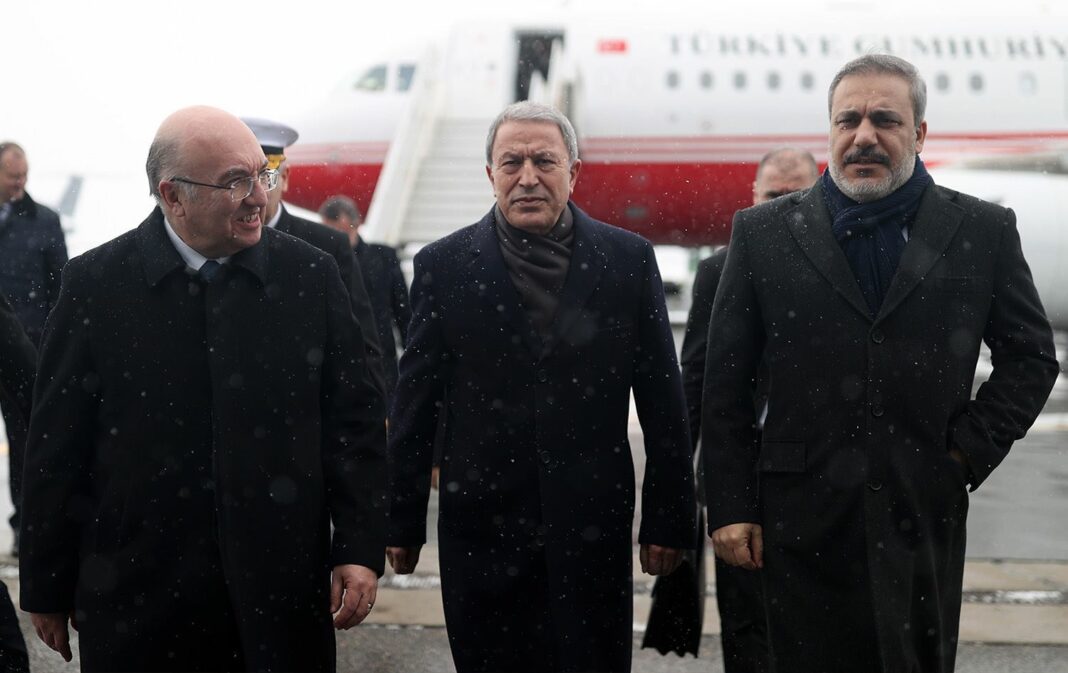Ahmet Yılmaz*
Russia has announced that it will postpone the payment of $20 billion owed by Turkish state-owned gas importer and distributor BOTAS until 2024. This follows the transfer of between $5 and $20 billion by Russian state-owned nuclear energy company Rosatom to Turkey for the construction of a nuclear power plant in Mersin on the Mediterranean coast. As Turkey is currently experiencing a severe economic crisis and presidential elections are scheduled for June 2023, Bülent Kuşoğlu, a member of parliament, has questioned the motivation behind Russian President Vladimir Putin’s support for Turkish President Recep Tayyip Erdoğan at this time. It is possible that this support may be part of a political compromise between the two leaders.
I think the answer to the motivation behind Russia’s support for Turkey lies in the tripartite meeting that took place in Moscow on Dec. 29, which included the defense ministers and intelligence chiefs from Russia, Turkey and Syria. This was the first official meeting between Turkey and Syria in 11 years, and it took place following suggestions from Russia. In November Turkey accused Kurdish groups in Syria of responsibility for a bombing in İstanbul and conducted airstrikes and the shelling of Kurdish targets in Syria. Erdoğan announced plans for a ground operation, but Russia said it opposed such a move unless Turkey normalized relations with the Syrian regime. It seems that this normalization process has begun with the meeting in Moscow.
It is possible that Russia is attempting to open new fronts in its general war against the West, and that in exchange for its support of Erdoğan, Putin wants him to launch an offensive against the Kurdish-led Syrian Democratic Forces (SDF) in Syria. This could be due to Russia’s deteriorating position in its war with Ukraine since it has lost the initiative and even some territory to Ukraine, which has received significant support from the EU, NATO and in particular the US. To counter this, Russia may welcome a conflict that affects the EU, NATO and the US, as it could distract these strong allies of Ukraine and potentially give Russia an advantage in the war.
The recent escalation between Serbia and Kosovo may serve as an example of how Russia could be using conflicts to distract the attention of the EU and NATO. Last month Serbia wanted to intervene in Kosovo to address unrest between the Kosovo government and the Serbian minority in Kosovo, similar to Russia’s intervention in Ukraine. The unrest was related to the use of license plates on cars, with Kosovo Serbs wanting to use their former Serbian plates and the Kosovo government refusing to allow it. When Kosovo Serbs set up roadblocks, the situation escalated. In October some political parties in Serbia signed a declaration calling for the reintegration of Kosovo into Serbia. In late December, Serbian troops were placed on combat alert along the Kosovo border, with Serbian President Alexander Vucic stating that “all measures are to be taken to protect the Serbian people in Kosovo.” As Kosovo is in Europe and there are NATO forces there, both the EU and NATO have had to deal with this issue, which could be welcomed by Russia as a way to divert their attention.
It is unusual for a seemingly minor issue such as the use of license plates to become a point of conflict, and it is possible that Russia may have played a role in Serbia’s response. Serbia has a long history of being a traditional Russian ally and has refused to join the European sanctions against Russia, and in May 2022 the two countries signed a favorable gas deal, with Serbia purchasing over 80 percent of its gas from Russia. Therefore, it is not far-fetched to consider the possibility of Russia’s involvement in Serbia’s reaction to the license plate issue.
Another potential conflict that could be of interest to Russia is the possibility of a Turkish ground offensive against US-backed SDF in northeastern Syria. While the US is opposed to such an offensive, Russia has indicated its support for it if Turkey and Syria normalize relations. There are US bases in this region near oil fields, and during a Turkish ground offensive, the presence of US forces could lead to a friendly fire incident or a false flag attack, potentially sparking a conflict between Turkey and the US. This could serve to distract Western attention away from Ukraine.
The content of the recent meeting between Russia, Turkey, and Syria provides clues about the potential for a joint Turkish and Syrian operation against Kurds in Syria. According to Turkish Defense Minister Hulusi Akar, the Turkish side emphasized that their presence in Syria is only for the purpose of combating the PYD (SDF) and the Islamic State in Iraq and the Levant (ISIL), and not against the Assad regime. He also stated that “joint patrols with Russia could be enhanced to triple participation with the addition of Syrian regime forces.” When these statements are considered together, it seems that Turkey may be interested in merging its forces with the Syrian regime against Kurds in Syria. It is worth noting that the Syrian regime and Iranian proxies are already separately fighting Kurdish forces, and with Russia’s mediation, they could potentially join forces with Turkey.
Both Turkey and Syria view Kurdish separatism and US support for Kurds as common problems, and anti-US rhetoric is commonly used by officials from both countries. Therefore, there is already a foundation for cooperation between Turkey and Syria. The only obstacle had been the anti-Assad rhetoric previously used by the Erdoğan regime, but Erdoğan has since stopped using such language.
*Ahmet Yılmaz has a master’s degree in international security strategies. He is using a pseudonym out of security concerns.

